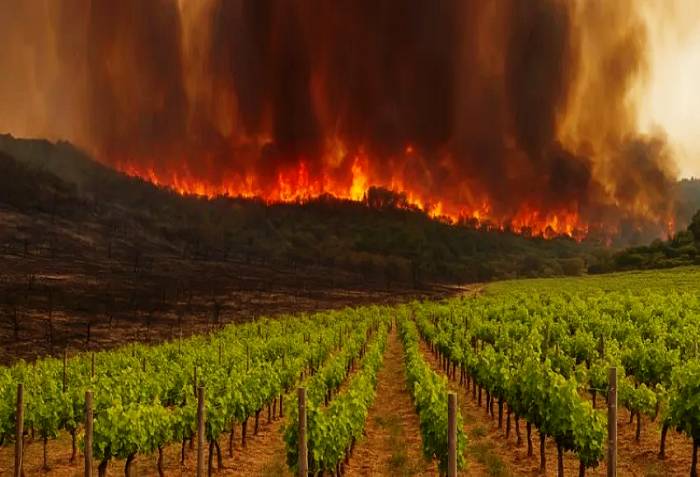Wildfires devastate vineyards and villages in Spain’s historic wine regions
More than 60,000 hectares burned with fatalities reported and villages evacuated
2025-08-20

Spain is facing one of its most severe wildfire crises in decades this August, with extreme heat, drought, and strong winds fueling simultaneous outbreaks across regions such as Galicia and Castilla y León. The fires have devastated more than 25,000 hectares in the province of Ourense and over 37,000 hectares in the Valderrey-Jamuz area of León. These are among the largest wildfires since 1968, forcing entire villages to evacuate and resulting in several fatalities.
The impact extends beyond the immediate destruction of forests and homes. Many of the affected areas are historic wine-producing regions, including Valdeorras, Monterrei, Ribeira Sacra, and Herreros de Jamuz. The fires have put the 2025 grape harvest at risk and threatened the survival of centuries-old vines. In some cases, farmers used heavy machinery to create firebreaks in an attempt to save their vineyards. Others watched as flames consumed leaves and grape clusters just as harvest season was about to begin.
In Ourense, local winegrower Ernesto Rodríguez described seeing “vineyards completely destroyed” after fires swept through Oímbra, Laza, and Verín. The president of the Monterrei Denomination of Origin, Manuel Vázquez, estimated that thousands of kilos of grapes could be lost but said it was too early to assess the full extent of the damage while fires remained active.
Specialized wine publications reported that in Valdeorras and Monterrei, plots with vines over three centuries old were burned. Paula Alonso from Fuentes del Silencio winery said they lost about 15% of their 25 hectares; some parcels disappeared entirely while others suffered partial damage. Experts warned that smoke exposure could ruin the quality of surviving grapes.
In Herreros de Jamuz, neighbors and firefighters worked together to protect ancient mencía and prieto picudo vines. Despite their efforts, some plots like La Fontanica were completely destroyed while others were partially scorched. The community has shown solidarity and determination to rebuild even after losing what would have been a historic harvest.
Local officials described how residents in Petín (Ourense) sought refuge in underground cellars as flames approached their villages. Two wineries were completely burned down. In Valdeorras, both homes and vineyards were destroyed, with local leaders warning of significant losses for both grape growers and livestock farmers.
Some stories offered rare moments of hope. In A Rúa (Valdeorras), the Méndez Rojo family’s vineyard narrowly escaped total destruction thanks to moist soil and careful management; however, around 300 vines suffered severe damage and a portion of the harvest was lost.
The fires also reached parts of Ribeira Sacra’s Bibei valley. Local wine authorities warned that smoke and high temperatures could ruin this year’s harvest even if vines survived the flames. They recommended irrigating and ventilating grapes to minimize damage.
The economic impact is significant for regions where viticulture is a mainstay. In Ourense alone, more than 60 out of 92 municipalities have vineyards that support local economies. Farmers described how years of work can be lost in a single day when fire strikes.
Technical advice from agricultural experts now focuses on recovery: assessing whether to replant or prune damaged vines and preparing for several years without full production. Some noted that vineyards can act as natural firebreaks due to their moisture content but warned that heat and smoke often render grapes unusable for winemaking.
Industry representatives called for changes in forest management policies and regulations that currently restrict winter brush clearing. They also urged government support for replanting efforts and long-term recovery plans.
While some areas like Rías Baixas avoided direct fire damage, they still faced challenges from high temperatures and smoke exposure. The broader concern among winegrowers is not only this year’s economic loss but also the growing threat posed by climate change and rural depopulation—factors that could make such disasters more frequent in the future.
The wildfires have left a lasting mark on Spain’s wine country this August, destroying historic vineyards, threatening livelihoods, and raising urgent questions about land management and climate resilience for one of Europe’s most celebrated wine regions.
Founded in 2007, Vinetur® is a registered trademark of VGSC S.L. with a long history in the wine industry.
VGSC, S.L. with VAT number B70255591 is a spanish company legally registered in the Commercial Register of the city of Santiago de Compostela, with registration number: Bulletin 181, Reference 356049 in Volume 13, Page 107, Section 6, Sheet 45028, Entry 2.
Email: [email protected]
Headquarters and offices located in Vilagarcia de Arousa, Spain.